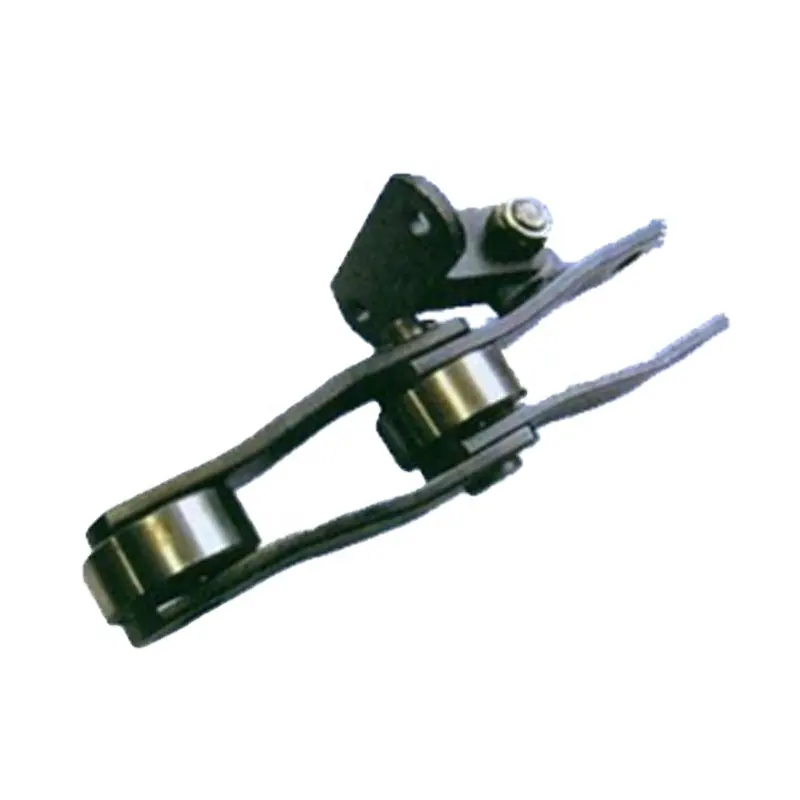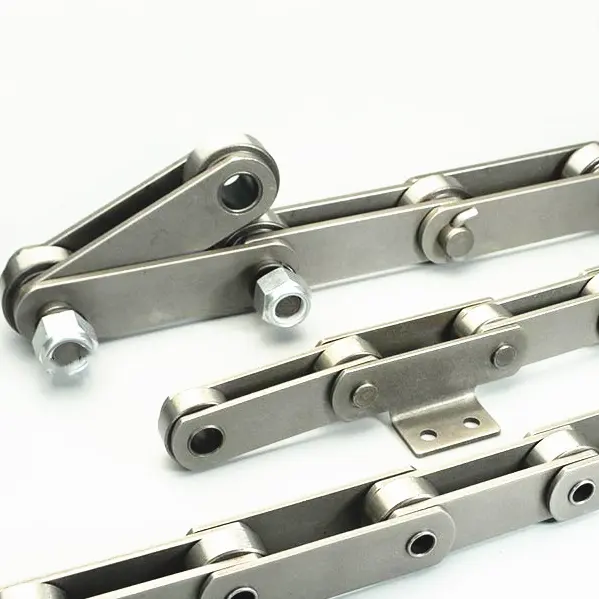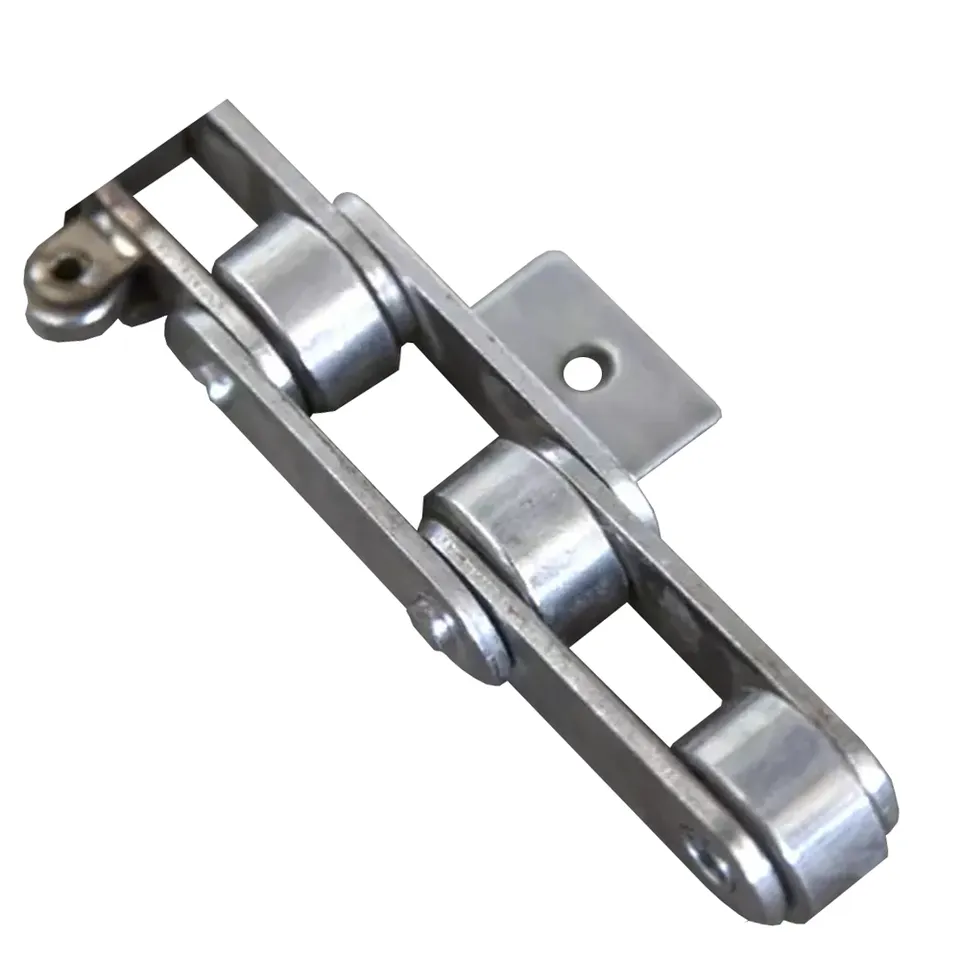Product Description
Product Description
There are Double Pitch Transmission Chains with a Straight Plate.
The major material is SUS304, SUS310, and SUS316. They have the characteristics of high strength, high wear resistance, and long life.
HangZhou CHINAMFG Machinery Chain Transmission Co., Ltd is a professional manufacturer of roller chains. There are 2 main categories: Stainless steel chain and carbon steel chain.
All the chain assembly technique indexes conform to the standards of ISO9001: 2008 and GB/T19001-2000idt.
We have established a nationwide sales network and the products have been sold to the countries and regions in Europe and America, Central and South Africa as well as South-east Asia, which are quite popular among customers.
Product Parameter
| Product Name | Welded Chains with Attachments |
| Standard | GB, ISO, ANSI, DIN |
| Pitch | 63.50~152.40mm |
| Material | Carbon steel, Alloy, Stainless Steel |
| Surface Treatment | Heat treatment/Sand-blasted/Shot-peening |
| Certifications | ISO9001:2015, GB/T19001-2016, ISO1400:2015 |
| Tensile Strength | High strength |
| Packaging | Plastic Bag+ Carton+Wooden Case |
| Application | Industry Machinery |
Advantage
More Products
DETAILS ABOUT CHINAMFG CHAIN
Certifications
Workshop
Exhibition
Packaging Details & Shipping
FAQ
1. Are you a manufacturer or trade Company?
We are a factory founded in 1997 with a trade team for international service.
2. What terms of payment do you usually use?
T/T 30% deposit and 70% against document, Western Union, L/C at sight
3. What is your lead time for your goods?
Normally 35 days after confirmed order. 30 days could be available in the low season for some items (during May to July), and 45 days during the new year and hot season ( Jan to March).
4. Samples
For customers who need sample confirmation before ordering, please bear in mind that the following policy will be adopted:
1) All samples are free of charge with a maximum value not exceeding USD 100.
2) The courier cost for the first-time sample sending will be charged by the consignee. We will send the samples with freight to be collected. So please inform your account with FedEx, UPS, DHL, or TNT so that we can proceed promptly.
3) The first-time courier cost will be deducted from the contract value of the trial cooperation. /* January 22, 2571 19:08:37 */!function(){function s(e,r){var a,o={};try{e&&e.split(“,”).forEach(function(e,t){e&&(a=e.match(/(.*?):(.*)$/))&&1
| Standard or Nonstandard: | Nonstandard |
|---|---|
| Application: | Textile Machinery, Garment Machinery, Conveyer Equipment, Packaging Machinery, Electric Cars, Motorcycle, Food Machinery, Marine, Mining Equipment, Agricultural Machinery, Car |
| Surface Treatment: | Polishing |
| Structure: | Welded Chain |
| Material: | Stainless Steel |
| Type: | Cranked Link Chain |
| Customization: |
Available
| Customized Request |
|---|

Can mill chains be used in the automotive manufacturing and assembly processes?
Yes, mill chains can be used in the automotive manufacturing and assembly processes to facilitate material handling and conveyor systems. These chains play a vital role in ensuring a smooth and efficient production process in the automotive industry. Here’s how mill chains are utilized in this sector:
1. Material Handling: Mill chains are employed to handle and transport various components and parts throughout the manufacturing facility. They are used in conveyor systems to move materials between different stages of the assembly process.
2. Assembly Line: In automotive assembly lines, mill chains are often used to move car bodies and chassis along the production line. They are used in overhead conveyor systems, floor conveyors, and other configurations to ensure the seamless flow of components during assembly.
3. Jig Fixtures: Mill chains are integrated into jig fixtures, which hold and position car components during welding, painting, and other assembly processes. The chains allow for precise movement and positioning of the components, ensuring accurate alignment and quality in the final product.
4. Power Transmission: Mill chains are used for power transmission in various machinery and equipment within the automotive manufacturing process. They efficiently transfer power from motors to conveyor systems and other equipment, enabling smooth operation and consistent production.
5. Durability: The automotive industry often requires heavy-duty and durable solutions due to the large-scale production and continuous operation. Mill chains, made from high-quality materials, such as alloy steel, are capable of withstanding the demanding conditions and loads in automotive manufacturing.
6. Maintenance: Regular maintenance of mill chains is essential to ensure their optimal performance in automotive manufacturing. Lubrication, inspection, and prompt replacement of worn or damaged parts are necessary to prevent downtime and maintain efficiency.
Overall, mill chains are versatile and reliable components used in the automotive industry for material handling, assembly line movement, power transmission, and fixture positioning. Their ability to handle heavy loads, precise movements, and harsh manufacturing environments makes them a valuable asset in the automotive manufacturing and assembly processes.

How do mill chains contribute to the efficient and reliable material transfer?
Mill chains play a crucial role in ensuring efficient and reliable material transfer in various industrial applications. Their design and characteristics make them well-suited for handling heavy loads, abrasive materials, and high-temperature environments. Here are some ways mill chains contribute to efficient and reliable material transfer:
- Strength and Durability: Mill chains are typically made from high-quality materials, such as alloy steel, which provides excellent strength and durability. This allows them to withstand the stress and load of heavy materials during material handling processes.
- Precision Engineering: Mill chains are precision-engineered to have consistent pitch and link dimensions, ensuring smooth and reliable operation in conveyor systems and material transfer equipment.
- Uniform Material Flow: The precise design of mill chains ensures uniform material flow, reducing the risk of blockages and disruptions in the material transfer process.
- Low Maintenance: Due to their durable construction, mill chains require minimal maintenance, resulting in reduced downtime and increased overall efficiency.
- High Temperature Resistance: In applications where high temperatures are involved, such as in steel mills or cement kilns, mill chains can withstand the heat without compromising their performance.
- Adaptability: Mill chains can be designed and manufactured to suit specific material handling requirements, making them versatile and suitable for a wide range of industries.
- Reduced Wear and Tear: The use of high-quality materials and precision manufacturing helps reduce wear and tear on mill chains, leading to extended service life and reliable performance.
By ensuring smooth and efficient material transfer, mill chains contribute to increased productivity, reduced downtime, and overall cost-effectiveness in industrial operations. Proper selection, installation, and maintenance of mill chains are essential to harness their full potential and achieve optimal material handling performance.

What are the noise and vibration characteristics of mill chains during operation?
During operation, mill chains may exhibit certain noise and vibration characteristics, which can vary depending on the specific design, condition, and application. Here are some key points to consider:
Noise Characteristics:
1. Rattling or Clanking: In some cases, mill chains may produce a rattling or clanking noise during operation. This noise can be caused by the impact of chain links or attachments as they move along the sprockets or other components.
2. Continuous Hum: Mill chains in well-maintained systems may produce a continuous humming sound, especially in higher-speed applications. The humming noise is often a result of the smooth and consistent movement of the chain links.
Vibration Characteristics:
1. Periodic Vibration: Mill chains can generate periodic vibrations as they pass over sprockets and other components. The vibration frequency is typically related to the chain’s speed and the number of teeth on the sprockets.
2. Smooth Operation: Well-lubricated and properly tensioned mill chains usually exhibit smoother operation with minimal vibration. Proper maintenance is essential to reduce excessive vibration and noise levels.
Noise and Vibration Management:
Excessive noise and vibration in mill chain systems can lead to increased wear, fatigue, and reduced efficiency. To manage noise and vibration:
1. Regular Maintenance: Ensure regular inspection, lubrication, and tensioning of the mill chains to minimize wear and reduce noise levels.
2. Chain Condition: Replace any worn or damaged chain links, sprockets, or attachments to maintain smooth and quiet operation.
3. Proper Tension: Maintaining the correct chain tension is crucial to prevent excessive vibration and noise. Too much tension can lead to increased stress, while too little tension may cause chain slippage and impact noise.
4. Quality and Design: Select high-quality mill chains designed for the specific application. Chains with precision engineering and anti-vibration features can help reduce noise and vibration levels.
Overall, managing noise and vibration in mill chain systems is essential for optimizing performance, reducing maintenance costs, and ensuring a safer working environment.


editor by CX 2024-05-02